Australian Tumbleweeds
The Future of Comedy isn’t Fisk
Okay, so to get the obvious out of the way: Fisk is the best sitcom the ABC has served up in years, and if it’s not a bonafide comedy classic it’s very close to being one. The cast is great, its sense of humour is spot-on, the whole thing is nicely paced and there’s even a warm fuzzy moment at the end when Fisk finally gets the hang of dealing with clients. Our reputation as haterz has faded (a little) over the years, but even so it’s a rare pleasure to have a series come along that we can point to and say “more of this, please”.
That said, it’s not without flaws. Kitty Flanagan has been funny on our screens for over 20 years now, almost always as a brash, straight-talking, slightly larger-than-life type. As Helen Tudor-Fisk, she is not that. As the series spells out, she is not a “people person”. Nor is she big on fashion, dealing with loud noises in cafes, or facial expressions beyond looking slightly puzzled at having to operate in the human world. She’s still funny – at times very much so – but for a sitcom that in many ways is kinda old-fashioned she isn’t the big brash comedy character you might have expected.
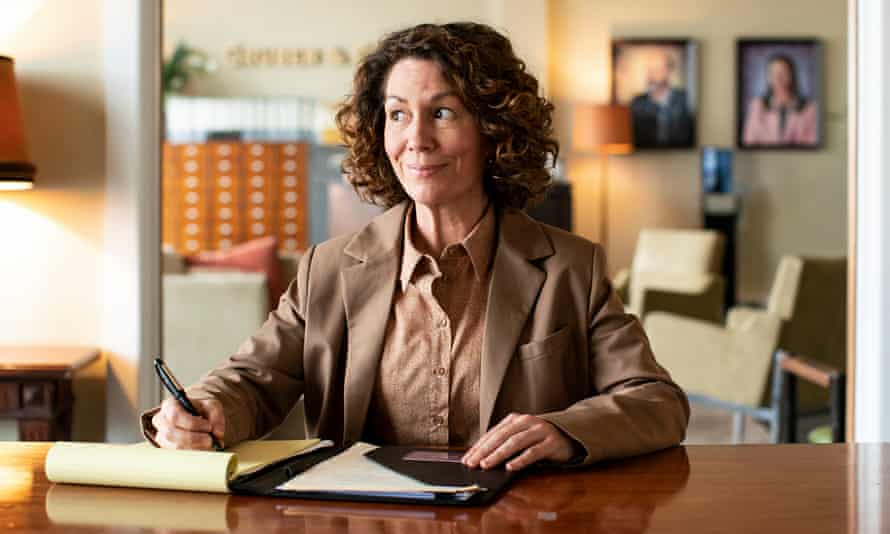
But even we can tell that’s in part because she’s set up to be the voice of reason in a workplace full of nutjobs (and with more coming in the door as clients). Again, this doesn’t so much subvert expectations as put an entertaining spin on them. Julia Zemiro’s office manager is set up to be a straight-laced comedy foil, but she’s the one who happily sits for Glenn Robbins’ penis painter (as in, he paints with his penis). And this is a show featuring Glenn Robbins as a man who paints with his penis, so it’s not like it isn’t going for big laughs.
That’s what’s so – we were going to say “refreshing”, but “good” is probably more accurate – about Fisk: it’s always going for laughs and it never apologises for it. Every scene either has jokes or is setting up jokes (and then has jokes); everything around the jokes is either there to make the jokes funnier or is trying hard not to distract from the jokes. At a time when it seems like every single ABC sitcom is required by law to constantly undercut the comedy with “dramatic” scenes or “arty” camerwork or “tasty” shots of food, watching a comedy that’s just “hey, let’s have a laugh” is a blessed relief.
So if this is so good, why doesn’t the ABC make more sitcoms like it? At a guess, we’d say in part this exists because the ABC wants a return on those years of investment in promoting the team at The Weekly. They made Flanagan an ABC personality and if she wants to do her own show it’s a decent way to (hopefully) recoup some of that PR spend. If you or I turned up at the ABC’s front door with an equally funny script but no ABC personality attached, we’re not getting through that door.
(this is also another reason to think less of Tom Gleeson: given an opportunity to move on from The Weekly and pitch whatever he liked, he chose a game show)
To get a comedy as retro as this up in 2021 you almost certainly do need friends in high places, because comedy doesn’t work if you’re not paying attention and today’s networks aren’t interested in shows you have to actually watch. Hang on, let’s explain this properly:
Back in Ye Olden Days, the whole idea of television was to get you to pay maximum attention to it. That was how they made money: they grabbed your attention, then sold it to advertisers. And comedy was perfect for this, because the more attention you pay to comedy, it better it is (you know, unless it’s crap).
But now, all that’s changed. Networks – by which we mean streaming services, who set the tone for everyone else (especially as everyone moves online) – don’t make their money by selling ad space: they make it by selling themselves as a service. So what they need is big flashy attention-grabbing shows to get you to sign up, and then once you’ve signed up they have to be as mild and unobtrusive as possible so you won’t think “why am I paying for this shite?” when it’s on in the background.
Comedy, as you might have guessed, is no longer optimised for this environment. For one thing, you have to pay attention to it for it to work; a joke half-heard is a joke that won’t get laughs. For another, while a crap drama still seems like a drama, a crap comedy isn’t funny and people aren’t keen on paying for duds.
With the stakes now higher – in the old days you might change the channel to avoid a bad comedy, but you’d be back because the channel wasn’t going anywhere; if a show is so shit you cancel the service, it’s going to take a lot to get you back – comedy has become a bad bet.
Fisk is very funny stuff, but for a casual viewer it’s mostly just a woman in a drab outfit sitting behind a desk. And with everyone surrounded by screens these days, we’re all casual viewers. So the moral of this story is: watch Fisk, and tell your friends to do likewise. Not just because it’s funny (again: it is) but because it’d be great to see more shows like it.
After all, what’s the alternative in a world where Tom Gleeson’s hosting a game show and Charlie Pickering’s back later this year with his Hypotheticals knock-off – Corona Cops the series?
Vale Why Are You Like This
Why Are You Like This was one of those shows that started out promising and then just ended up a bit of a mess. Why? Well, in a nutshell, because halfway through the series it decided to divert from doing what it was decent at, parodying young, cool woke people in inner-city Melbourne, so it could explore a serious issue. The serious issue, in this case, being depression.
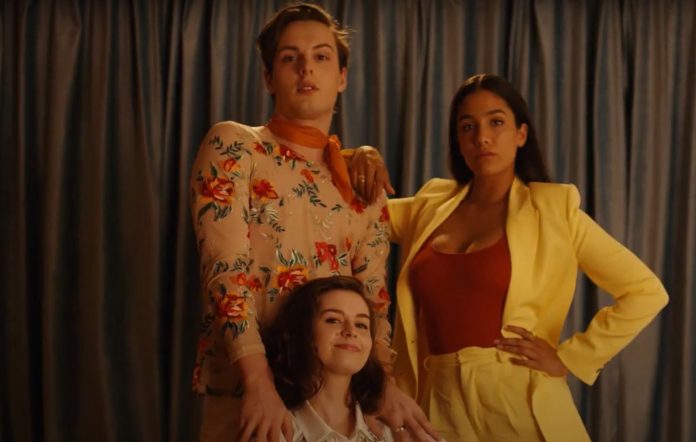
We’re not saying it’s never okay to include serious issues in a comedy show – what is satire if not a bunch of serious issues being made more palatable by adding some laughs? We’re also not saying that it’s never okay to include plots about depression or characters with mental health issues in a sitcom – Fawlty Towers, The Rise and Fall of Reginald Perrin and You’re the Worst all did that very successfully. And indeed, writing an episode of your sitcom which focuses on serious issues, seriously, can have a huge impact on the audience. If you do it once. But if you do it across multiple episodes then…wasn’t this supposed to be a sitcom?
Why Are You Like This was at its best when it dissected youth fads and cancel culture, parodied the irredeemably conceited and selfish, and created funny moments by showing how being a well-intentioned “ally” can sometimes make things a lot worse. The episode where Penny (Naomi Higgins) had to help an old school company with its digital transformation, and ended up getting half the workforce the sack, was bitterly funny, all the more so for Roz Hammond’s involvement in a key role (which she reprised in the final episode of the series). But meanwhile…here’s a character with depression!
What is it with depression and mental illness subplots in sitcoms at the moment? We get that, finally, after millennia of silence and shame, people suffering from depression and mental ill health are making their voices heard…but as a viewer of a sitcom, you’d have to be a sociopath to find the subject funny.
So why do sitcoms seem to keep doing this (Please Like Me, Everything’s Gonna Be Okay, Why Are You Like This)? Is discussing social issues like depression and mental health now more important in a sitcom than getting laughs? We hope not, because it sure made what could have been a consistently funny and entertaining social satire not particularly hilarious anymore.
It’s usually at this point in our reviews that we wonder if a show will get a second series. In the case of Why Are You Like This, it probably will given it has the backing of both Netflix and the ABC. But let’s hope when it does, it sticks to parodying youth fads and awful people, and avoids lurching into serious subjects that it’s ill-equipped to handle.
Vale Aftertaste
You get the sense with programs like Aftertaste that their goal isn’t to make us laugh, or entertain us, or to satirise something happening in our society, or even to examine the human condition. No, their goal is to stay alive. Staying alive, in TV terms, meaning: GET ANOTHER SERIES.
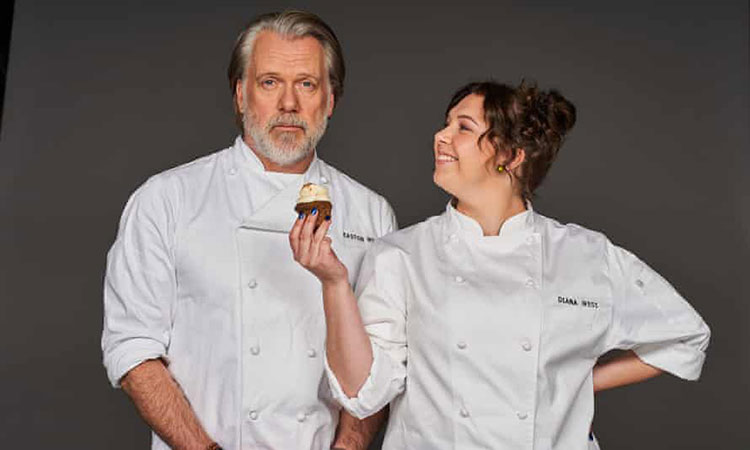
Aftertaste’s relentless drive to GET ANOTHER SERIES was manifest from episode one, when the first seeds of doubt were sewn about Grandma June (she’s thought to be dead but is she really?), and when the first taps of the endless drumbeat of Diana’s ambition were sounded. The drumbeat that would, inevitably, Adelaide being Adelaide, take Diana far away from Adelaide in order to have the career she wants.
If Aftertaste gets a second series, and it probably will, this will all play out: Grandma June will bowl up in town and bring even more chaos with her than her dead ex-husband Jim, and Diana will return from London in triumph. Or have become successful far closer to home. Or maybe she’s just moved into her own flat down the road? The big finale with the ‘up yours’ cake at least left us guessing.
There are a lot of positive things to say about Aftertaste – it had a good cast, great scenery, it was occasionally funny, and the clash of ‘teenage woke feminist’ and ‘arrogant older bloke’ was less annoying than it could have been – but the big negative was always that it was plotted by THE BOOK. THE BOOK being one of those tomes written by some great American showrunner, which tells you when to introduce the A-plot, the B-plot, the C-plot, the D-plot, etc, and which generally make almost everything on TV these days solid but predictable.
By the way, we’re not naïve to the benefits of following the advice in THE BOOK – go watch a random selection of TV from the 60’s, 70’s and 80’s and you’ll see that a reasonable amount of it will feature a meandering or inconsistent plot, and some pretty strangely-drawn characters. Having said that, old TV shows are often less predictable than their modern-day equivalents, and do, at least, feel unique and different.
But if unique and different is what you need to sacrifice in order to GET ANOTHER SERIES, then why not? Everyone likes to stay in employment, right?
So, vale, Aftertaste. There were some promising elements in there, but subtlety of plotting was not one of them. And – and this is kind of key for a sitcom – it really should have been possible to get more laughs out of that mismatched family, so what the hell went wrong?
Give Us 30 Minutes, We’ll Give You the [Expletive]
One of the good things about watching The Weekly is… ahh, nearly had you there, didn’t we? That’s right: there are no good things about watching The Weekly, just a slowly building puzzlement as your brain – a thing that exists in 2021 – struggles to figure out exactly why you are watching a news recap on television – a thing that seemingly is being broadcast from 1964.
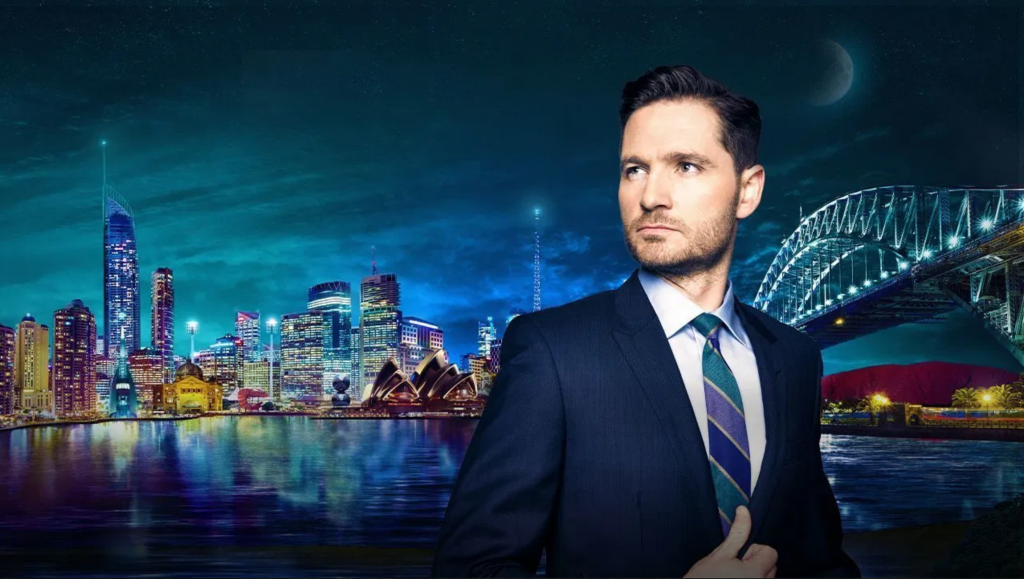
We’ve been half-heartedly working on a post for weeks looking at all the ways The Weekly has changed over the years because if the ABC had any shame at all they’d have re-titled it at least three times by now to reflect the actual contents of the show. But the one thing that’s stuck with us through all the head scratching and trying to figure out what the deal was with Briggs is this: who is The Weekly currently aimed at?
Now more than ever, The Weekly is just a straight news recap, a half hour news bulletin only the stories are at least a day old so technically they’re no longer even news. “I watched the news so you don’t have to”. “Give us thirty minutes and we’ll give you the week”. These slogans are repeated every single episode; it’s safe to say they’re a mission statement in a way that “it’s a comedy!” never was.
But who is it aimed at? Not young* people (*anyone under 50), as they’re constantly online and either know all this stuff already or don’t care. Not old* people (*anyone over 50) as they’re the people who still watch the nightly news. Something like Have You Been Paying Attention? can get away with it by using a full hour to cover so much stuff there’s probably something you missed, but The Weekly‘s half hour “in depth” approach just means it’s telling you a handful of things you already know. Five minutes on that royal interview that 1.4 million Australians watched two days earlier? Is there anyone who really thinks Charlie Pickering is going to add anything to that conversation?
Of course, HYBPA? is also funny, whereas The Weekly is… look, our endless snarky digs aside, it’d be very difficult to argue with a straight face that the 2021 version of The Weekly is still trying to be funny in the same way it once was. Well over half the show now is straight news coverage with the occasional joke thrown in (this week’s recap of the week ran for more than two-thirds of the show). Add in a lengthy explainer (“The Study”) usually covering something that can charitably be called “old news”, then the guest comedian does something (that often is funny) and it’s over.
It used to be that comedy was what justified The Weekly‘s existence. It was recapping the news to make jokes about the news. But as the other regular cast members have fallen away* and not been replaced – maybe Judith Lucy will return after her current tour, but she hasn’t been mentioned once this season and Luke McGregor seems to have gone AWOL as well – it’s become just a news show with some snark sprinkled on top.
Isn’t it the case that so long as he throws a little bit of snark on each news story, the ABC can claim the use of other network’s news stories is “satire” and therefore fair use that they don’t have to pay for? Bargain! And yes, that is true. It’s also true that the ABC has, you know, their own entire massive news department constantly churning out news reports they can also use for free. But then they wouldn’t be able to make Andrew Bolt seem like a charming eccentric.
So what’s the point? Everyone who could possibly be watching this has already seen everything being covered, and it’s not really adding much new to the coverage. If they wanted to do a straight news recap, they could easily throw together a much more comprehensive one using the ABC news department; if they wanted to do a decent comedy recap, they could sack Pickering and use the money to hire some funny young people and – more importantly – get some full time writers to really work on the material.
But neither of those things would star Charlie Pickering, who while utterly pointless is clearly a TV host and therefore the kind of person the ABC believes should be hosting a television show. Possibly because they already agreed to pay him a vast sum of money for reasons.
So who cares if that show is shrinking around him like a shrinky-dink in an oven? It’s Pickering that’s bringing in the crowds! Ok, yes, the crowds are roughly identical to the crowds for Foreign Correspondent at the same time Tuesday and slightly smaller than for Four Corners on Monday which does kind of suggest that the ABC’s 8.30pm audience is rusted on and you’d have to put on something really awful to scare them off – which explains why Q&A rates so badly on Thursdays. Long story short, The Weekly is safe!
… until the ABC figures out a way to get loveable crime-solving biddy Vera to host a news recap, then Pickering is totally fucked.
.
*When The Weekly began it had three regular cast members who were on every week; now it has one cast member and one (1) slot for a rotating roster of guest comedians.
Body Count’s in the House
It’s barely over twenty four hours now since Aftertaste delivered its most shocking development yet. For five episodes crusty old Jim (Peter Carroll) was a diamond in the rough, a sour grump with a heart of gold whose sniping at son Easton West (Erik Thompson) and granddaughter Diana (Natalie Abbott) as they cleaned up his slovenly country cottage and turned it (and the shed out back) into a high class eatery only underlined the firm family bond that united them. And now he’s gone. Who could have possibly seen this tragic death coming?
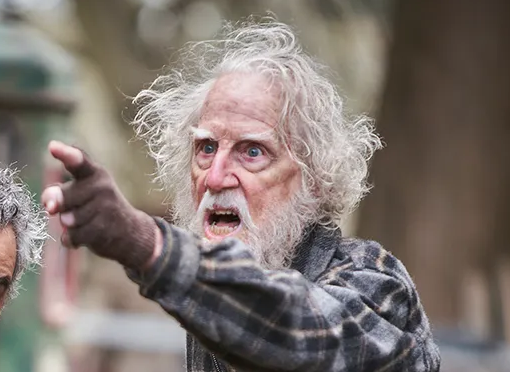
Okay, enough with the bullshit. Killing off a “much loved” character towards the end of your dramedy is pretty much the cheapest, dullest, most predictable move you can make and by pulling it out of the back pocket Aftertaste just confirmed that whatever it’s trying to do, providing audiences with a decent story isn’t it. Jim might as well have been wandering around wearing a hat reading BORN TO DIE; at least then there might have been a chuckle in his oh-so-predictable demise.
If you think we’re being a bit harsh here – and sure, Aftertaste has generally been doing okay as a mildly pleasing, easily digested wander through the Adelaide hills just so long as you don’t expect to laugh – let us direct your attention to this round up of the shocking climaxes of Australia’s most critically acclaimed yet weak as piss dramedy of recent times, Please Like Me.
*Season one: Peg dies, final episode set at her funeral.
*Season two: Ginger kills herself, everyone takes a camping trip to dwell on it.
*Season three: Ben has a cerebral aneurysm and could “die at any minute” for an episode or two. Has big operation that could kill him. Shock twist: he doesn’t die.
*Season four: Josh’s mum, who first appeared in episode one having tried to kill herself, kills herself.
When your story is repeating the moves of one of the laziest, most shoddily-plotted Australian series in recent memory, maybe you should have set your sights a little higher? Sure, having a funeral in your final episode is a great way to remind audiences that you’re not mucking around, but only in the sense that it reminds them that as far as coming up with a series of interesting events that will keep them engaged – you know, a story – you really are just mucking around.
After all. it’s not like the death raised the stakes in any meaningful narrative fashion. Oh no, which extremely old bastard is going to die next in a show that now contains zero extremely old bastards? Quick, set the final episode in an old folks home and start coughing on them.
It’s not even a show that’s about death. At least the first time Thomas pulled this hackneyed trick out of some vague memory of The (UK) Office ending its second season on a downer he could pretend it was about a bunch of young people being forced to confront the reality of death. But here, in a series where the real stakes – Weston’s comeback, Diana’s future – are already set in stone? Having some old coot pop his clogs meant nothing beyond a way to get the cast looking sharp in black next week.
Oh right: it wasn’t funny either. Though as we’ve been discussing Josh Thomas (and Australian comedy in general #zing) that goes without saying. Speaking of Australia’s number one comedy export who isn’t Hannah Gadsby – press release time!
JOSH THOMAS’ EVERYTHING’S GONNA BE OKAY TO PREMIERE 9 APRIL, ONLY ON STAN
1 March, 2021 – Stan is today announcing that the second season of the critically acclaimed comedy series Everything’s Gonna Be Okay from Josh Thomas – the creator and star of the International Emmy-nominated series Please Like Me – will premiere on 9 April, same day as the U.S. and only on Stan.
After their heartbreaking trip to New York, the Moss family and Nicholas’ boyfriend, Alex, are just trying their best to move forward. With everyone back home, Matilda is rethinking her life goals, Genevieve starts putting herself out there—even dating—and Nicholas is working out how to balance being a brother, parental figure, boyfriend and cute entomologist.
This season also welcomes new eccentric friends, unexpected hookups and a lot more bugs. In addition to Thomas as Nicholas, the series stars Kayla Cromer as Matilda, Maeve Press as Genevieve and Adam Faison as Alex. Thomas, Stephanie Swedlove and Kevin Whyte serve as executive producers, with David Martin, Jon Thoday and Richard Allen-Turner executive producing for Avalon.
Everything’s Gonna Be Okay premieres 9 April only on Stan, with new episodes weekly.
“Heartbreaking trip to New York”? You don’t say.
Lover Come Back to Me
Hey, Josh Lawson’s got a new movie out! Though you’d be forgiven for having missed it, as this time around he hasn’t been able to stir up controversy by calling it “an Australian film for people who hate Australian films” like he did with his last film The Little Death. But like his last film, Long Story Short is another quirky take on that can o’ worms we call love – Lawson had better be careful or he’ll turn into another Peter “King of Romance” Hellier.
Unlike Hellier’s various projects, where the extent of the imagination on offer is “what if Australia made sitcoms where the wife was clearly out of the husband’s league?”, Lawson has gone all high concept here: what if you found yourself moving fast-forward through your relationship, only checking in for minutes each year? If you guessed “a whole lot of standing around going ‘what the fuck is going on?’,” collect your prize at the front desk.
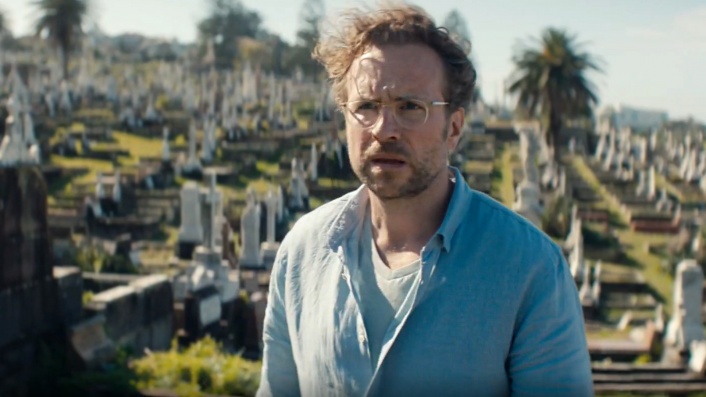
Better reviewers than us – so pretty much all of them – can discuss the films strengths at length. Briefly, the performances are good, Lawson displays some ability as a director (it wasn’t until later that we realised the film, which feels like your usual expansive summer rom-com, has maybe five main cast members and takes place in three locations), some of the jokes aren’t bad, and so on. Long story short (ha), this contains most of the things you’re probably looking for in a rom-com.
The one thing it doesn’t have, is a decent plot. It’s the big screen version of your typical Aussie sketch comedy sketch: someone has a decent idea, there’s high fives all around, and nobody ever gets around to thinking up any interesting twists or developments that might logically flow from that initial idea. Hey wait, isn’t that what we said about his last film?
Whereas The Little Death at least packed in a bunch of aimless sketches into 90-odd minutes, this features just the one, as if in tacit acknowledgement that plotting is never going to be Lawson’s strong point so maybe keep the plot stuff to a bare minimum. It’s probably a smart move, but it doesn’t do much of anything to hide the fact that this is a film that takes ages to get going and then doesn’t really go anywhere.
After a somewhat fun meet cute and a lot of blathering around, our lead Teddy (Rafe Spall) starts racing through his marriage one year every few minutes. All that actually means is that he spends a few minutes finding out how things have been going (spoiler: not well) and then suddenly lurches forward another year*. He has zero agency throughout most of the film – everything just happens to him – so while any similarities to something like Charles Dickens’ A Christmas Carol are most definitely intentional, Dickens remembered to also give us some cool ghosts.
To be fair, there are a couple of minor subplots running throughout the future that add some much needed texture to events. The film actually acknowledges that he’s moving into the future, with a few slightly amusing technological developments in the background. And Leanne (Zahra Newman) as the wife is pretty good; she has to show the changes over the years while keeping the core of their relationship alive, which is tricky to pull off as well as she does here.
This comes out and references Groundhog Day so it clearly doesn’t mind the comparison, but the difference between this and Groundhog Day – the moral of which it somehow manages to get wrong – is that once Groundhog Day established its premise it went absolutely nuts exploring every possible angle. This has Teddy leaving a message for his mate to do something a year later then it’s a year later and his mate messed up so it doesn’t happen and he gives up on trying to change things. Makes you think.
There’s really only two ways this story can end and you get absolutely nothing for guessing that this chooses the one where the entire film could have just been someone slipping Teddy a note saying “don’t let life pass you by”. After 90 minutes spent watching this, it’s a message that really does hit hard – though probably not in the way the filmmakers intended.
.
*well, one version of him does – the other (who we never see) just lives through his life one day at a time. So after a while it’s basically a movie where a middle-aged man is briefly possessed by his 30-ish self for a few minutes every year.
Pop goes another one
Radio National’s new science-themed comedy quiz show The Pop Test seems perfectly designed for the golden age of audio content we’re supposedly living through. It’s putting a different spin on niche-interest topics, it features interesting people you haven’t heard of (some scientists), and there are some entertaining people you have heard of as well (comedians). Throw in some rounds of questions on that week’s theme and an arbitrary scoring system, and what’s not to like?
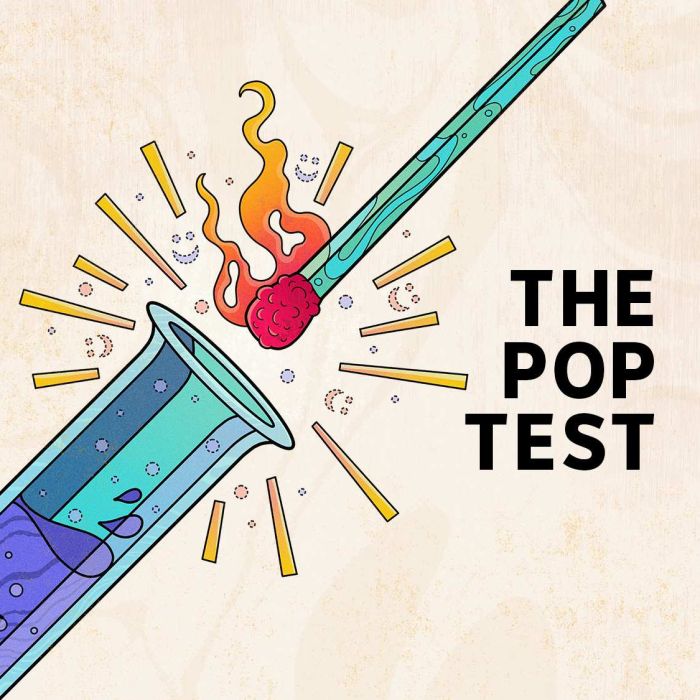
Well, the science bit for one. Look, if you’re interested in science maybe there’s something here for you, but if you decided to listen because Shaun Micallef or Dilruk Jayasinha or Alice Fraser or even Norman Swan is on – and you’re expecting comedy gold – well, they’ve all been in funnier shows. Especially Norman Swan.
The BBC show The Infinite Monkey Cage, which is surely an influence on The Pop Test, does a better job of mixing comedy and science because it puts the emphasis on science, using comedians who know a bit about science and can be funny about it to lighten the mood between largely-serious segments involving Professors and researchers. On The Pop Test, though, the format – which can only work if all panellists can be both interesting and funny about science – limits the comedians to trying to improvise funny answers to serious questions about science, because they don’t know about science, and limits the scientists to being serious about the science because they don’t know how to be funny.
You remember us banging on about how Australian comedy producers always screw up by limiting the scope of the comedy that can be done in their shows? Well, here we go again!
And maybe if ABC Radio made a comedy show more often than once every five, then these kinds of mistakes wouldn’t be made. Maybe.
Science is the kind of topic that broadcasters like Radio National are always going to want to make shows about, and fair enough too, there is an audience for this kind of thing. The problem is, this is a show which probably isn’t science-y enough for science nerds, but also isn’t going to work for the wider audience who likes comedy because it’s not funny enough.
On the plus side, Dr Karl Kruszelnicki isn’t anywhere to be heard on this program. So that’s two bonus points to team Pop Test.
Why Should We Watch This?
Big question first: should the cast of new ABC / Netflix sitcom Why Are You Like This? be filed under Millennials or Gen Z? The Millennial case comes strong out of the gate: the characters are clearly in their mid 20s, the first version of the series (a couple of Fresh Blood shorts) aired in 2017, the “official” cut off date for being born a Millennial is 1997, there you have it, why was this even a question.
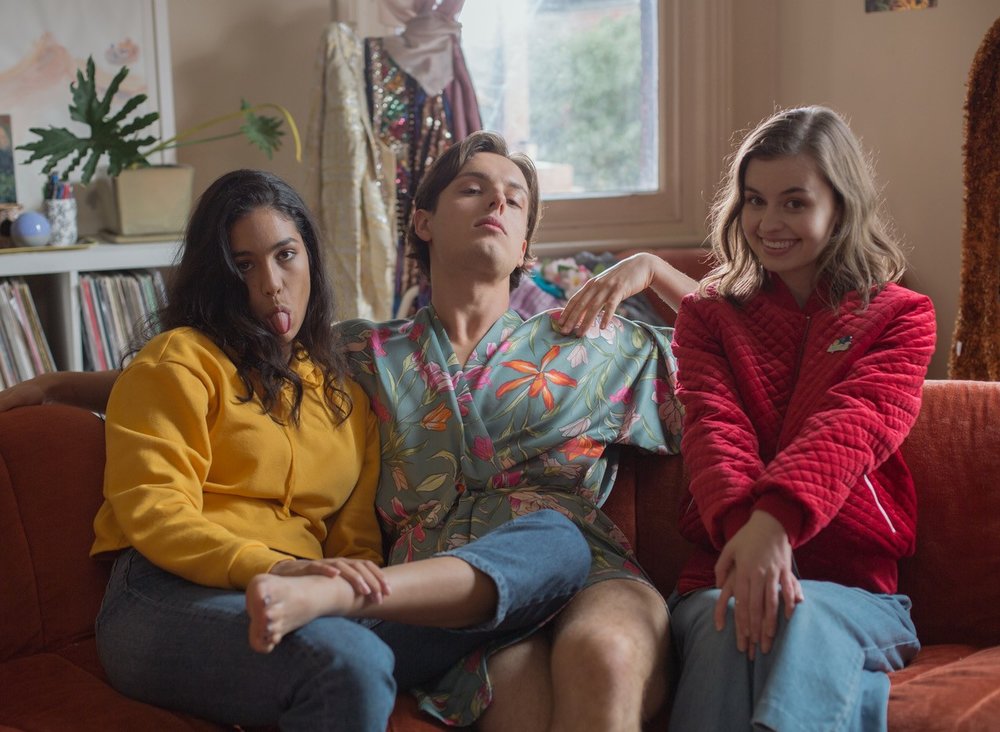
But there’s a problem. Millennials are no longer “young” – the oldest ones are now pushing 40. And Why Are You Like This most definitely skews “young”… or at least, it does if you’re the ABC publicity department, who are always faintly desperate to make sure we all know they make shows that the cool kids would love if they ever went near the ABC. So from a marketing standpoint – and is there any other at the ABC? – they’re Gen Z all the way.
The real problem here is that this show kinda wants to be cool, and the ABC really really wants it to be cool, but cool and comedy really don’t go together. The funniest version of all this is one where the characters are clearly Millennials acting like Gen Z (wait, what’s the difference?) because they refuse to grow up. That would make them funnier, but it would also make them kind of dorky (note to self – research “dorky” awareness amongst Gen Z), and the ABC publicity department isn’t big on dorky unless it’s a character clearly past 35 and in a charming rural setting.
Anyway, we said a lot of what we have to say about this back in 2018, as that’s when the first episode of this series first aired. The second episode (the first two aired back-to-back: you can watch the whole series on iView) was even better, in large part because it expanded Penny’s woke tyranny to a client who’s workplace was stuck firmly back in the 1970s. Mia’s vaginal calamity subplot? Not so great.
There’s two strands to the comedy here: in one, the cliches around people in their early-to-mid-twenties are exaggerated for comedic effect, while in the other the relationship between two characters who fit together in some obvious superficial ways but are bad for each other on a personal level is mined for comedy.
(the second is also pretty much the dynamic in the ABC’s other sitcom, Aftertaste. Readers looking to pitch sitcom ideas to the ABC take note)
The first strand is well-worn territory and you know… *gestures towards shows ranging from The Bondi Hipsters to Nathan Barley*. It always seems like a good idea but hardly ever works, largely because most people aren’t really aware of what’s being made fun of and those who are often find themselves too invested in what’s cool to enjoy the mockery unless it’s really well done.
… and it is not really well done here, though the high number of cliched shock-based jokes excused by the characters self-awareness and social status (“it’s ok, I’m gay”) does raise some interesting questions about how progressive the comedy – though not the show as a whole – actually is.
The second strand is a bit more promising, even if it’s largely downplayed in the first couple of episodes. Australia hasn’t created a classic character comedy in a long time and this definitely isn’t going to be it, but we’ve got to start somewhere and “my personal beliefs require me to be pushed around by my amoral and exploitative best friend” is a dynamic with legs.
It’s funny how quickly Broad City faded from what we currently know as “the cultural conversation”, but that’s good news for Why Are You Like This? – it means that it’s stepping into a niche that’s wide open. As for exactly why it’s wide open? Well, Broad City made the mistake (well, “mistake”) of first and foremost being a zeitgeisty comedy (so once the online mood shifted to “we hate Trump”, all that great press dried up), whereas Why Are You Like This? can get away with a bunch of dud moments because it puts some currently marketable elements front and centre.
Which is a fancy way of saying that more often than we’d like it’s trying to be cool rather than funny.
I Fought the Law and the Law Won
Press release time!
Kitty Flanagan’s all new comedy series FISK to air on ABC in March
ABC TV and Screen Australia are thrilled to announce the premiere of the hilarious six-part series Fisk Wednesday 17 March at 9pm on ABC TV and iview. Fisk is a 6 x 30 min comedy series created, written and directed by – and starring – one of Australia’s favourite comedians, Kitty Flanagan.
Flanagan stars as Helen Tudor-Fisk, a corporate contract lawyer forced to take a job at a shabby suburban law firm specialising in wills and probate. As well as the incomparable key cast including Julia Zemiro, Marty Sheargold, Aaron Chen, John Gaden and Glenn Butcher, the laugh-out-loud series is filled with a who’s who of Australian comedians and actors, including Alison Whyte, Glenn Robbins, Debra Lawrance, Denise Scott, Sam Pang, Georgina Naidu, Bert La Bonte,
Ed Kavalee, Collette Mann, Dave O’Neil and Marg Downey, just to name a few.Helen (Flanagan) is a contracts lawyer who is not good with people. When her personal and professional lives implode spectacularly in Sydney, Helen runs home to Melbourne and takes a job at Gruber & Gruber, a small suburban law firm. Helen is brought in to replace Roz Gruber (Zemiro), a recently-suspended solicitor who has temporarily appointed herself the office manager. No longer allowed to sit in with clients, Roz now has nothing else to do but get all up in Helen’s business.
Ray Gruber (Sheargold), Roz’s brother, hires Helen in a fit of laziness but also because Helen is a ‘mature lady’ which has proven to be the preferred option for clients who are grieving. Unfortunately, Helen is not that kind of mature lady.
Roz is always lurking, Ray is always skiving off and there’s often a scuffle in reception that Helen is forced to take control of. With the help of the idiosyncratic probate clerk, George (Chen), Helen attempts to find her feet in the messy world of probate; where the clients are at their most irrational and it’s never as simple as just dividing up the money.
Australian comedy’s love of the law goes way back – Welcher & Welcher, Marshal Law, half your comedy faves from the 80s were studying law, and so on. So with that proud heritage in mind, we can safely say that this will be another Australian comedy series. Also, it sounds pretty good. Hurrah!
How Do You Solve a Problem Like Hughsey
Hughsey We Have a Problem is back for 2021, which is great news for people putting together a Hughsey soundboard for their all-robot commercial radio station and barely worth a shrug for the rest of us. A panel of Australian “celebrities” banter amongst themselves and occasionally solve people’s problems in between the kind of guest appearances that used to be a mainstay on talkshows back when there were talkshows? Yeah, we’ll be over here watching pretty much anything else.
That’s just our personal taste, mind you. Right from the start Hughsey We Have a Problem has been refreshingly clear about its objectives and while any objective that involves giving Kate Langbroek airtime is one we oppose, we’re not going to pretend that she’s not popular*. The Hughsey / Langbroek pairing was a massive radio draw for years, the roster of supporting guests is usually decent, people like Hughsey, it features Hughsey doing his Hughsey voice Hughsey Hughsey Hughsey.
So why the hell has it suddenly turned into a game show?
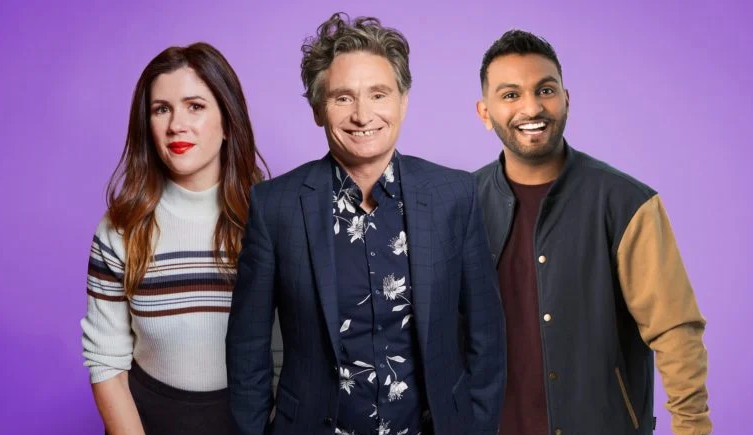
Seriously, we’re not making this up: now Hughsey is handing out points to panel members for how well they’ve solved someone’s problem, and the winner at the end of the night gets (a legally binding document releasing them from any and all commitments to ever appear on the show again? – ed) a crap glass trophy knocked up by a nearby locksmith. Why?
While we can think of plenty of reasons why this is a bad idea – it adds nothing to the show, it’s a pointless distraction that the show barely commits to, how is it even a competition if Hughsey is just awarding points for advice (maybe wait and see if the advice actually helps?), an advice show is not a game show, and so on – the only reason we can think of to go ahead and do it is because some network executive shouted at a meeting “be more like Have You Been Paying Attention!” and they realised they sure couldn’t be as funny.
Aside from this jaw-dropping decision which is honestly one of the stupider things we’ve seen Australian television do in a long time and we watched Sando, the rest of the show was… eh. The first problem was “some people are worried about taking the Covid vaccine” which seemed more like a topical news story than a problem considering Australia doesn’t currently have the covid vaccine, so presumably that HYBPA-loving network executive rang up with a few more notes.
Cast-wise, Becky Lucas and Nazeem Hussain are now series regulars, which might be worthwhile but only if Lucas continues to wear that “what the fuck am I doing here” expression she had at the start of this episode. At least the guests managed to liven things up a little; Gary Busey had his face cleaned by a parrot, so that’s something. And speaking of washed up movie stars, Ross Noble is now dressing like Steven Seagal, which is never a fun comparison to make.
These shows live or die by the panel banter and thanks to some fairly obvious editing it all moved along reasonably quickly even when the gags themselves were nothing special. If HYBPA is like the best 5% of Australian commercial radio brought to television, this is closer to the endless call-in segments that make up the rest of Austereo’s “comedy” output. But you get to see Hughsey with combed hair, so that’s something.
The real comedy highlight was early on when Ross Noble had just made a joke, the camera was on him and suddenly Kate Langbroek screeched out “No!” so obviously they cut to her. Yelling over the top of people to get attention has been her deal since her Triple R days and it’s clearly working for her; why change now?
(we did mention the show’s crap ratings, didn’t we?)
.
*though possibly not that popular
